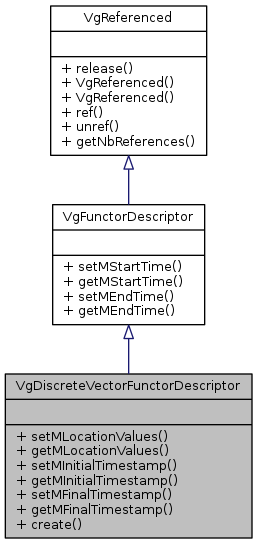|
VisioMove SDK (Android)
2.1.22
|
|
VisioMove SDK (Android)
2.1.22
|

Public Member Functions | |
| void | setMLocationValues (VgLocationValuePairVector value) |
| VgLocationValuePairVector | getMLocationValues () |
| void | setMInitialTimestamp (double value) |
| double | getMInitialTimestamp () |
| void | setMFinalTimestamp (double value) |
| double | getMFinalTimestamp () |
 Public Member Functions inherited from VgFunctorDescriptor Public Member Functions inherited from VgFunctorDescriptor | |
| void | setMStartTime (float value) |
| float | getMStartTime () |
| void | setMEndTime (float value) |
| float | getMEndTime () |
 Public Member Functions inherited from VgReferenced Public Member Functions inherited from VgReferenced | |
| synchronized void | release () |
| VgReferenced () | |
| VgReferenced (VgReferenced pThis) | |
| void | ref () |
| int | unref () |
| int | getNbReferences () |
Static Public Member Functions | |
| static VgDiscreteVectorFunctorDescriptorRefPtr | create () |
This class describes a functor for positions using discrete samples. The resulting functor will interpolate the positions using linear interpolation. The mInitialTimestamp and mFinalTimestamp members will be mapped with the animation's duration (meaning that initial timestamp correspond to animation start, and final timestamp will be mapped to animation end) The descriptor must contain at leats one orientation value.
|
static |
This static method returns a new heap-allocated descriptor. It is the only method that should be used to instantiate new descriptors. It is a way to make sure no one will delete it, except the last VgRefPtr pointing to it.
| double VgDiscreteVectorFunctorDescriptor.getMFinalTimestamp | ( | ) |
| double VgDiscreteVectorFunctorDescriptor.getMInitialTimestamp | ( | ) |
| VgLocationValuePairVector VgDiscreteVectorFunctorDescriptor.getMLocationValues | ( | ) |
| void VgDiscreteVectorFunctorDescriptor.setMFinalTimestamp | ( | double | value | ) |
| void VgDiscreteVectorFunctorDescriptor.setMInitialTimestamp | ( | double | value | ) |
| void VgDiscreteVectorFunctorDescriptor.setMLocationValues | ( | VgLocationValuePairVector | value | ) |